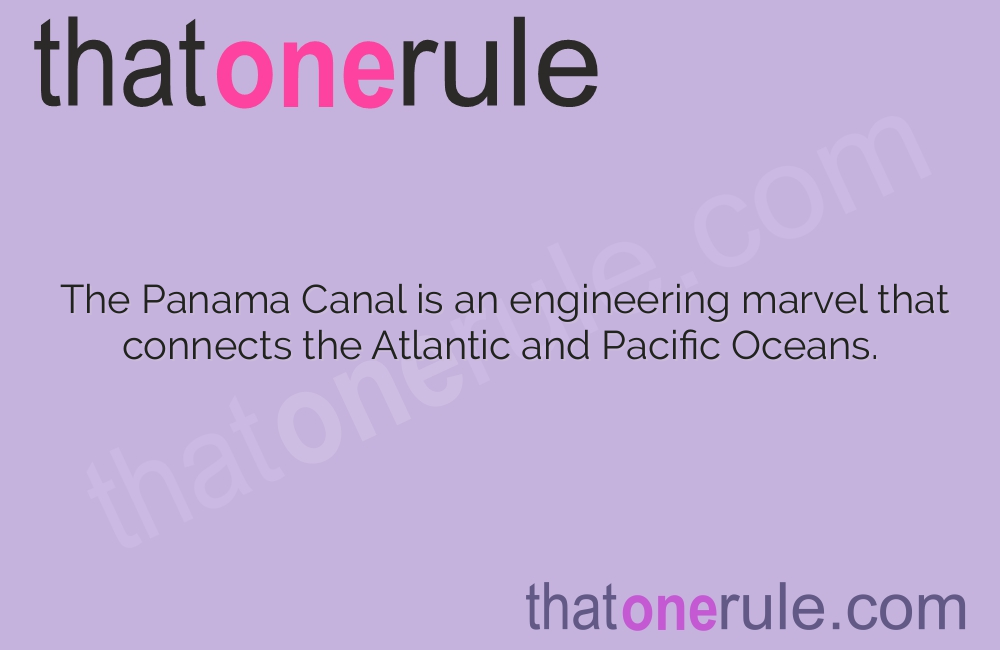9 Fascinating Facts about the Panama Canal

The Panama Canal is an engineering marvel that connects the Atlantic and Pacific Oceans.
With a length of 82 kilometers, the Panama Canal is a remarkable feat of human ingenuity.
The canal was built by the United States and opened in 19
4. The construction of the Panama Canal took over 10 years to complete.
More than 75,000 people worked on the construction of the canal.
The Panama Canal saves ships an average of 8,000 miles on their journey.
The canal has three sets of locks that raise and lower ships to different sea levels.
Ships pay tolls to use the Panama Canal, based on their size and cargo.
The Panama Canal is an important transit route for international trade.
The canal cuts through the Isthmus of Panama, a narrow strip of land connecting North and South America.
The French started the construction of the canal but had to abandon it due to financial difficulties.
The United States took over the construction of the Panama Canal after buying the failed French project.
The canal is a vital transportation hub, connecting the Americas to the rest of the world.
The Panama Canal was designated as a UNESCO World Heritage Site in 2007.
The construction of the canal had a significant impact on the surrounding environment.
The canal generates revenue for Panama through toll collections, tourism, and related activities.
It is estimated that the construction of the Panama Canal cost around $375 million.
9 Fascinating Facts about the Panama Canal part 2
The canal is a popular cruise destination, offering breathtaking views of the locks and surrounding landscapes.
The locks of the Panama Canal use an intricate system of water chambers and gates to control water flow.
Over 14,000 vessels pass through the canal annually, carrying goods from around the world.
The maximum size of a ship that can pass through the Panama Canal is known as the Panamax.
The canal has undergone significant expansion to accommodate larger ships, known as Neopanamax vessels.
The expansion of the Panama Canal was completed in 2016, doubling its capacity.
The Panama Canal Authority is responsible for the operation and maintenance of the canal.
The canal has greatly facilitated maritime trade between Asia, Europe, and the Americas.
It serves as a crucial shortcut for ships, saving time and fuel costs.
The construction of the canal faced numerous challenges, including disease outbreaks and difficult terrain.
The Panama Canal Zone was once a US-controlled territory, but it was returned to Panama in 1999.
The canal has transformed Panama’s economy and infrastructure, becoming a symbol of national pride.
The locks of the canal are a remarkable example of modern engineering and hydraulic technology.
The Panama Canal has been recognized as one of the Seven Wonders of the Modern World.
It is estimated that over 1 million ships have transited through the Panama Canal since its opening.
The canal significantly reduces shipping costs and allows goods to reach markets faster.
Ships passing through the Panama Canal are required to have a Panama Canal pilot on board.
The canal has had a profound impact on global trade patterns and the development of shipping routes.
The canal provides employment opportunities for thousands of Panamanians.
The expansion of the canal has attracted larger cruise ships and increased tourism in Panama.
The Gatun Lake, created during the construction of the canal, is one of the largest artificial lakes in the world.
The Panama Canal has influenced the geopolitical dynamics of the Americas, transforming Panama into a key player.
Ships passing through the canal pay tolls that can reach millions of dollars, depending on their size.
The canal has faced challenges in recent years due to climate change and water scarcity.
Efforts are underway to make the Panama Canal more sustainable and reduce its environmental impact.
The canal is a source of national pride for Panamanians and is depicted on the country’s currency and stamps.
Canal transit can take between 8 to 10 hours, depending on vessel size and traffic.
The Panama Canal has been instrumental in promoting global trade and fostering international cooperation.

